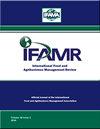The economics of farming expansion in the Brazilian Cerrado under possible effects of climate change
IF 1.5
4区 经济学
Q3 AGRICULTURAL ECONOMICS & POLICY
引用次数: 0
Abstract
This analysis assesses the financial viability of legally investing in native Cerrado vegetation deforestation for crop production, considering climate change. The study uses data from twelve different crop models based on three different climate models to predict potential future crop yields in cleared land for growing soy and maize. The outcomes show that in many micro-regions, investments in clearing land for crop production would destroy economic value, that is, generate a negative net present value because of low/negative and volatile cashflows driven primarily by future yields as affected by climate. Our analysis was carried out based on present agricultural practices and technology. As climate changes, farmers may adapt their practices, which can lead to more resilient and productive crops, or grow different crops, which could provide better returns on investment in clearing land than the ones resulting from our analysis. Despite various uncertainties, farmers, policy makers and financial institutions should be aware of the climatic and financial risks associated with land clearing in Brazil, mainly in micro-regions in which all scenarios resulted in negative outcomes in the investment analysis.气候变化可能影响下巴西塞拉多地区农业扩张的经济效益
本分析报告评估了在考虑气候变化的情况下,合法投资砍伐塞拉多原生植被用于作物生产的经济可行性。研究使用了基于三种不同气候模型的十二种不同作物模型的数据,以预测开垦土地用于种植大豆和玉米的未来潜在作物产量。研究结果表明,在许多微型地区,开垦土地用于作物生产的投资会破坏经济价值,即产生负净现值,因为现金流低/负且不稳定,主要受气候影响的未来产量驱动。我们的分析是基于目前的农业实践和技术进行的。随着气候的变化,农民可能会调整他们的耕作方式,从而种植抗逆性更强、产量更高的作物,或者种植不同的作物,从而获得比我们的分析结果更好的开荒投资回报。尽管存在各种不确定性,但农民、政策制定者和金融机构仍应意识到与巴西土地开垦相关的气候和金融风险,主要是在投资分析中所有情景都导致负面结果的微型地区。
本文章由计算机程序翻译,如有差异,请以英文原文为准。
求助全文
约1分钟内获得全文
求助全文
来源期刊

International Food and Agribusiness Management Review
AGRICULTURAL ECONOMICS & POLICY-
CiteScore
2.90
自引率
0.00%
发文量
0
审稿时长
>12 weeks
期刊介绍:
The IFAMR is an internationally recognized catalyst for discussion and inquiry on issues related to the global food and agribusiness system. The journal provides an intellectual meeting place for industry executives, managers, scholars and practitioners interested in the effective management of agribusiness firms and organizations.
IFAMR publishes high quality, peer reviewed, scholarly articles on topics related to the practice of management in the food and agribusiness industry. The Journal provides managers, researchers and teachers a forum where they can publish and acquire research results, new ideas, applications of new knowledge, and discussions of issues important to the worldwide food and agribusiness system. The Review is published electronically on this website.
The core values of the Review are as follows: excellent academic contributions; fast, thorough, and detailed peer reviews; building human capital through the development of good writing skills in scholars and students; broad international representation among authors, editors, and reviewers; a showcase for IFAMA’s unique industry-scholar relationship, and a facilitator of international debate, networking, and research in agribusiness.
The Review welcomes scholarly articles on business, public policy, law and education pertaining to the global food system. Articles may be applied or theoretical, but must relevant to managers or management scholars studies, industry interviews, and book reviews are also welcome.
 求助内容:
求助内容: 应助结果提醒方式:
应助结果提醒方式:


